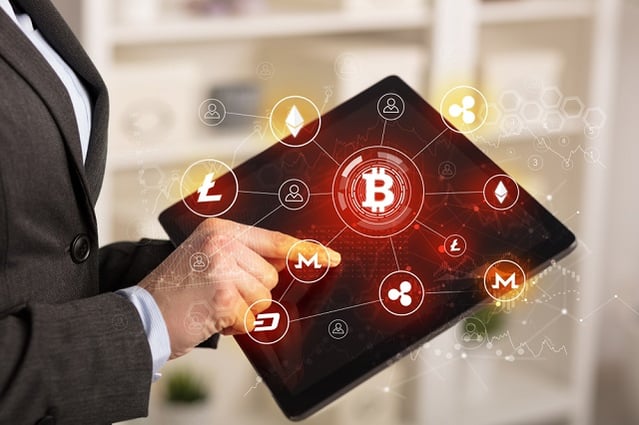
Did you know that over 300 million users, which is close to the U.S. population, have already embraced the use of cryptocurrencies? In September 2021, the cryptocurrency market reached a total value worth $2.16 trillion. These numbers suggest the increasing need for blockchain wallet apps. You’ll need a crypto wallet to store all your digital coins and ensure security, anonymity, and make huge financial gains.
This article highlights the following takeaways:
- You will be able to decide which type of wallet works best for your requirement
- Although it involves a lot of effort, creating a bitcoin wallet increases the level of security compared to traditional payment methods.
- Fewer coins mean that you can launch your crypto wallet faster. You won’t have to incorporate it with several blockchain networks, thus accommodating different digital currencies.
What Is a Blockchain Wallet and Why Do You Need It?
Using blockchain-based cryptocurrencies requires answering questions like “What is a blockchain wallet and why do you need one?” A blockchain wallet refers to a cryptocurrency wallet that lets you manage Bitcoin, Ethereum, and other types of cryptocurrencies.
Unlike traditional money transfer mechanisms, which require the presence of an intermediary (typically a bank), and constant monitoring of accounts, transferring and exchanging funds is fast, easy, and secure with a blockchain wallet because of its several features. These include easy accessibility from the web and mobile devices and the ability to protect users’ identity and privacy.
Types of Crypto Wallets
If you’re aiming to develop a cryptocurrency wallet app, you should familiarize yourself with the different types of crypto wallets.
-
Wallets based on Governance
First, decide whether you prefer to develop a centralized (custodial) or decentralized (non-custodial) crypto wallet. With a custodial crypto wallet, you need to create private digital keys to let the wallet work on a server. These digital keys are like organized strings of words that serve as a password to your wallet.
Then, non-custodial crypto wallets create a secret backup phrase inside the wallet application itself. Thus, customers can ensure their funds’ safety without depending on third parties. If you’re the only owner of the keys to a wallet, no other person can access your money.
-
Hot and Cold Wallets
Knowing the types of blockchain wallets also means learning about hot vs cold wallets. Hot wallets refer to online wallets that allow you to immediately transfer cryptocurrencies. A faster transfer is made possible by storing private keys in the cloud. You can access them online 24/7 using your mobile device or desktop. However, this type of wallet includes risks of theft and other online vulnerabilities. Blockchain.info and Coinbase are considered hot wallets.
Meanwhile, cold wallets refer to digital offline wallets, which means each transaction is signed offline and disclosed online. They’re not stored in the cloud and are just kept offline for increased security. Ledger and Trezor belong to cold wallets.
There are several sub-categories that fold under hot and cold wallets:
- Software Wallets: Software wallets refer to applications you download on your mobile device or a desktop. They can also be a web-based wallet that you can access online. Examples of software wallets are Copay, Jaxx, and Breadwallet.
- Online wallets: Users can access these hot wallets on the Internet using any device, such as a desktop, tablet, or mobile device. The private keys are saved online and handled by a third party. For example, you can get the Bitcoin wallet GreenAddress on Android, iOS, the web, and a desktop.
- Desktop wallets: These cold wallets store private keys in cold servers like your desktop. You could disconnect this wallet from the Internet, transact offline, and then make it online again. Your desktop serves as a backup server if the main server is lost. While you can download the wallet on any computer, you can only access them from the specific system where they’re installed. Make sure the desktop you’re using for the wallet is safe. One popular desktop wallet is Electrum.
- Mobile wallets: Mobile wallets are like online wallets, but can only be used and accessed on mobile devices. You can transact effortlessly as the wallet’s interface is easy to navigate. An example of a great mobile wallet is Mycelium.
-
Hardware Wallets
Hardware wallets store the private keys in a safe hardware device like a USB. The wallet is like a portable device you can plug into your computer. This kind of wallet is safer against malicious attacks. When performing transactions, make sure your hardware wallet is connected to your computer system.
-
Paper Wallets
Paper wallets involve an offline method to store cryptocurrencies. The printer paper contains your private and public keys, and you can access them through a QR code. Common paper wallets include MyEtherWallet and Bitcoin Paper Wallet, which are ideal for storing huge amounts of cryptocurrencies.
Benefits of Integrating a Crypto Wallet for Your Business
Despite common misconceptions like web wallets as the least secure option and the ability to generate a new password to crypto wallets, a crypto wallet offers several benefits.
-
High Security and Encryption
Through cryptography, you can benefit from enhanced security with cryptocurrency wallets. All data is encrypted and no one can see it apart from the wallet holder. You get an extra layer of security from two-factor authentication and multi-signature wallets, making cryptocurrency wallets more secure compared to other forms of digital payments.
-
Ease of Use
One of the major benefits of a crypto wallet is its ease of use. After installing the crypto wallet app, you can already use it immediately. You can focus on a wallet app that accepts a single or several types of data transactions depending on what you aim to focus on in your blockchain wallet development company.
-
Seamless Transfers and Low Transaction Fees
You can also enjoy quick, smooth, and hassle-free transactions worldwide with cryptocurrency wallets. You won’t need intermediaries, so you can expect low to no fees too.
-
Stability
Blockchain technology allows the distribution and verification of the same data. By using the bitcoin wallet app, you can be confident that the data is not compromised, corrupted, or lost.
How We Plan and Design Cryptocurrency Wallets From Scratch
It may be challenging to develop a cryptocurrency wallet, but with careful planning and execution, you can produce an exceptional app.
-
Develop a Good Understanding of Blockchain and Crypto Technologies
Building crypto wallet apps requires a thorough understanding of blockchain and crypto technologies. Digital currencies like cryptocurrencies work because of blockchain technology. The blocks have digital information, while the chain refers to the cryptographic principle that makes the connection of data blocks possible. You use blockchain to share data safely and securely.
-
Use APIs
APIs allow you to develop a cryptocurrency wallet app that’s full of features. By utilizing a distributed ledger API, you can quickly synchronize the crypto wallet and the blockchain ecosystem. Your blockchain wallet development company can speed up the app development process.
-
Move to the Cloud
If you’re developing a web application, you can select Platform as a Service (PaaS). However, if you’re focusing on crypto wallet development, find a Blockchain as a Service (BaaS) provider like Microsoft, Azure, and Amazon. Then, apply their cloud service to your application.
-
Select the Right Tech Stack
If you want to develop a scalable crypto web app, Angular.js or Node.js together with CSS3 and HTML5 are great options. If you’re aiming for iOS apps, you can use Objective-C or Swift. Then, for Android apps, you have Kotlin and Java.
-
Ensure Security
Prioritize security in your crypto wallet app through two-factor authentication, face ID, hardware authentication, and fingerprint passcodes. Continuously provide security updates and fix security problems immediately using the most recent technology.
-
Do Competitor Research
Find out what your competitors are doing, including the technologies and features they’re using. This way, you can look for ways to stand out and provide more unique and efficient features in your app.
-
Start Your App Development Process
When starting app development, decide on the application features to use and write the code. Then, design an easy-to-use interface, and run extensive blockchain tests before finally launching your crypto wallet app. Doing so ensures not only safer and more secure transactions but also the success of your app in the market.
The Key Features We Include in the Blockchain Wallet
Crypto wallet apps should contain important features that promote convenience, efficiency, and security.
-
QR Code Scanner
With a QR code scanner, crypto wallet app transactions become faster, easier, and more secure. Users no longer need to type long characters because the wallet addresses are scanned automatically.
-
User Authorization
Apart from the usual username and password, you can improve your crypto wallet app’s user authentication through two-factor or multi-factor authentication. This gives users an extra layer of protection.
-
Paper Wallet Imports
Your crypto wallet app should also let your users scan a paper wallet. They can do so with the QR code for transacting crypto money.
-
Multiple Currencies
Various currencies are added now and then with changing values. Thus, your crypto wallet app must support several currencies. This also leads to smooth transactions of varying currencies.
-
Enable Push Notifications
To keep your users updated with crypto transactions, enable push notifications. They’ll be informed of their digital money’s price, both successful and failed transactions, and more. The feature also shows that notifications to every transaction are performed in real-time.
-
Incorporate the Latest Conversion Rates
Given that conversion rates are always changing, your crypto wallet app should also stay updated and calculate transaction fees according to the latest rates. This is especially important in the case of various transactions, from the same digital currencies, and different digital currencies, to fiat and digital currencies.
-
Enable Blockchain-Based Transactions
Because of blockchain technology, your users can quickly and securely send and receive digital currencies through your crypto app. As each completed transaction is transferred to the blockchain network, users can also check their balance and transaction history.
-
Manage Familiar Addresses
With this feature, users can enjoy a faster and easier transaction process. This is because they have a way to manage all addresses that are often used.
-
Create Secure Payment Gateways
With secure payment gateways incorporated into your wallet app, users can effectively buy and sell digital assets without any trouble.
-
Set Up Optional Session Logout Feature
Through this feature, users are automatically logged out from the app after a certain time. This gives added security when using the crypto wallet app.
Final Thoughts
Besides knowing the benefits of a crypto wallet, understanding hot vs cold wallets, and exploring volume blockchain wallets, you need the right planning and guidance to successfully develop blockchain wallet apps. Let QASource take care of your blockchain testing needs. Contact us today for pricing details.


